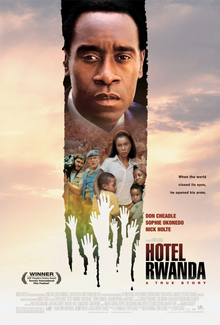 |
| Source: Wikipedia |
Stay out of trouble, he says, and protect your family, because family matters most. Then trouble actually comes. Tough to stay calm when you're knee-deep in corpses.
Hold on, back up. It's urbanized Africa, mid-nineties. People seem to seize any excuse to feel better than other people, so racism is embedded in human nature, and skin color makes for a very visible excuse. In this case, Hutus and Tutsis were arbitrary distinctions set up by the occupying Belgians. Decades later, pissed-off Hutus want revenge for Tutsi injustices toward their parents and grandparents. A caustic radio program spurs the hateful Hutus to machete-swinging massacre.
This puts our protagonist in a predicament. He's Hutu, married to a Tutsi, with no strong feelings either way. Effectively westernized, he runs a posh joint for visiting dignitaries. All his problems he smothers with style -- poise, class, elegant lies. But smiles and bribes can't block bullets.
When destitute refugees flock to him, bloodthirsty mobs in pursuit, he appeals to UN Peacekeepers (200 assigned for the whole country, and they can't fire a shot) and the guilt of Western powers (who don't want to get involved, just like the hero himself before the problem plopped on his doorstep).
Essentially, reality hacks a civilized man's ideals to pieces, which bleed out face-down in the dirt. He grows increasingly haggard as the body count racks up and even more angry dudes with guns yell in his face.
At last, in a borderline parody of "white people to the rescue," a team of volunteers extracts the refugees piecemeal from the hotel's ruins. Not that it's easy, or a bloodless transition. But thanks to them and people like them, there's this story to tell.
A story which I've hardly heard till now. Because, over one million bodies later, it seems nobody's learned a thing.
121 minutes.
No comments:
Post a Comment